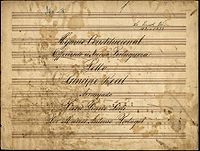| English: Hymn of the Charter | |
|---|---|
 Copy of the original "Hymno da Carta". | |
Former national anthem of | |
| Music | Pedro IV of Portugal, 1821 |
| Adopted | May 1834 |
| Relinquished | 5 October 1910 |
| Preceded by | Hymno Patriotico |
| Succeeded by | A Portuguesa |
The Hymno da Carta (English: Hymn of the Charter, modern Portuguese spelling: Hino da Carta) was officially proclaimed the national anthem of the Kingdom of Portugal in May 1834. [1] It was composed by King Pedro IV of Portugal. "Carta" stands for the Constitutional Charter which Pedro IV granted to Portugal. The anthem remained officially in place until 19 July 1911, [2] nine months after Portugal became a republic, and was replaced by A Portuguesa .